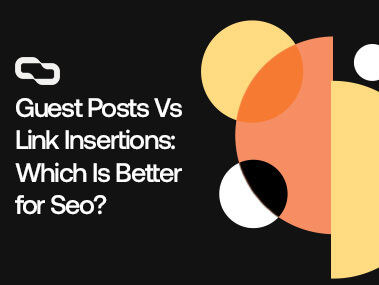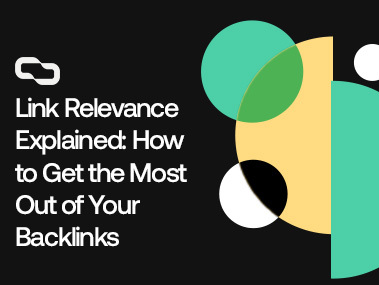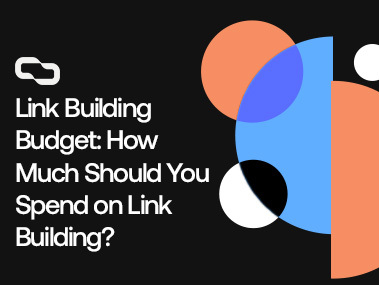Link Popularity: What It's & How It Affects Your SEO Rankings
Link Popularity: What It's & How It Affects Your SEO Rankings
If ranking at the top of Google is a contest, it's definitely a popularity one. But in this competition, it's not just about who has the most friends—it's about who has the most influential ones.
In SEO, these friends are the websites that link to your site, vouching for your credibility and relevance.
This is what we call link popularity, and it's a critical factor that search engines use to decide who gets the limelight and who stays in the shadows.
In this article, we’ll go over the definition of link popularity, why it matters, and how to increase your site’s link popularity score.
Key Takeaways
Prioritize getting backlinks from a variety of reputable and relevant sources rather than amassing a large number of links from fewer sources.
Focus on earning backlinks from authoritative sites within your niche, as these are more impactful and signal to search engines that your content is valuable and trustworthy.
Utilize strategies like pursuing 'followed' links, considering niche edits, and leveraging tier 2 links to enhance your site's link popularity effectively, while being cautious with the use of PBNs to avoid penalties.
What Is Link Popularity?
Link popularity refers to the number and quality of backlinks that point to a web page or a website.
Imagine you're in a huge library with countless books on various subjects.
Now, think of your website as one of those books.
The more people recommend your book, the more likely it is to be considered valuable and given a prominent place in the library, so customers can find it more easily.
This is essentially what link popularity is in Search Engine Optimization (SEO.)
Now, link popularity isn’t just about how many links (recommendations) you get, it’s also about the quality of them.
Getting a link from a highly respected web site is like getting a thumbs up from an expert in your field. It carries more weight than a nod from a less-known site.
So, while the number of links is important, their quality is crucial too.
Why Is Link Popularity Important?
Search engines are the librarians of the internet. They want to recommend the best resources to their users.
But they can’t read and assess the quality of documents the same way humans do, so what do they do instead?
They rely on other factors they can gauge, such as user signals and backlinks.
If your web site has a lot of high-quality links pointing to it, search engines will take this as a sign that your website is valuable, trustworthy, and relevant.
This can help your website appear higher in search results, making it easier for customers to find you.
Common Link Popularity Metrics in Search Engine Optimization (SEO)
1. DR & UR by Ahrefs
Ahrefs provides two important metrics: Domain Rating (DR) and URL Rating (UR).
Think of DR as a measure of the overall strength of a website's backlink profile compared to others in Ahrefs database.
It's a score from 0 to 100, with higher numbers indicating a stronger backlink profile.
UR, on the other hand, focuses on the strength of a single web page's backlink profile.
It also ranges from 0 to 100 and helps you understand how well a specific page is likely to perform in search engine rankings based on the number and quality of its backlinks.
2. DA & PA by Moz
Moz offers Domain Authority (DA) and Page Authority (PA), which are somewhat similar to Ahrefs' metrics but with their unique twist.
Domain Authority looks at the overall strength of a website's domain, predicting how likely it is to rank in search engine results. Similar to Domain Rating (DR), it's scored on a scale from 0 to 100.
Page Authority (PA) is Moz's version of Ahrefs UR. It gauges the strength of a single page.
The higher the PA, the more likely that page will rank well in search results.
3. AS by Semrush
Authority Score (AS) by Semrush is another key player in the metrics game.
It combines various measures, including backlink data, website traffic, and more, to give a comprehensive view of a domain's influence and authority.
It's more like a multi-faceted score that looks at the big picture of how a web site is positioned on the Internet.
4. CF & TF by Majestic
Finally, we have Citation Flow (CF) and Trust Flow (TF) by Majestic.
Citation Flow predicts how influential a URL might be based on how many sites link to it AKA its link popularity. It's all about the quantity of links, not necessarily their quality.
Trust Flow, however, adds the quality dimension by measuring the trustworthiness of a website based on the value of the backlinks.
It basically rates the reputation of a website. The higher the TF, the more authoritative and trustworthy the domain is considered.
Factors That Influence Site's Link Popularity
1. Link Quality
Not all links are created equal. An editorial link from a well-known and respected website, like a major news outlet or an academic institution, is far more valuable than a link from a random, obscure blog.
It's like getting a recommendation from a top expert in your field compared to a casual mention by an acquaintance.
High-quality links are seen as endorsements, signaling to search engines that your content is valuable and trustworthy.
2. Link Attribute
Link attribute types are the tags added to links that tell search engines how to consider them. The most common attributes are "nofollow" and "dofollow."
A "nofollow" link tells search engines that you don't trust this source, so they shouldn't pass on link equity or value. A "dofollow" link, on the other hand, tells search engines that this is a good resource, so they should rank it higher.
It's like the difference between someone whispering a recommendation about you versus shouting it out loud for everyone to hear.
3. Link Quantity
While quality trumps quantity, having a higher number of backlinks can also signal to search engines that your content is popular and relevant.
However, it's crucial not to sacrifice quality for quantity. It's great to have a large crowd, but if they're all highly respected and credible, your reputation soars even higher.
4. Link Relevance
If you run a cooking blog, a link from a renowned chef's website is far more relevant and valuable than a link from a site about car repair.
Major search engines aim to provide users with the most relevant information, so they value links that are contextually aligned with your content.
It's like getting a nod from someone in your own field of expertise—it just makes more sense.
5. Link Placement
Where your link appears on a web page can influence its value.
A link in the main body of a page carries more weight than a link buried in the footer or sidebar.
It's just like getting featured on the front page of a newspaper versus a small blurb on the last page.
Visibility matters. Links that are easy to find and relevant to the content around them are more likely to be clicked on and valued by search engines.
6. Anchor Text
Anchor text is the clickable text in a hyperlink.
Acquiring links with descriptive and relevant anchor text can help search engines understand what the linked page is about.
For example, if a gardening website links to your cooking blog with the anchor text "delicious vegetable recipes," it helps search engines and users alike to know what to expect on your page.
How to Increase Link Popularity?
Building link popularity isn't just about gathering as many incoming links as you can. It's about getting the right backlinks the right way. Here's how you can do that:
1. Diversify Your Backlink Sources
Imagine if all your friends lived in the same house.
It's great to have friends, but if they're all from the same place, this doesn't really broaden your social circle.
Similarly, it's better to have backlinks from a variety of different web sites rather than many from just one.
Search engines like Google see guest posts from diverse domains as a sign that a wide range of sources finds your content valuable.
2. Relevance is Key
Think about a time when someone recommended a restaurant that perfectly suited your taste – it felt relevant and thoughtful, right?
The same goes for backlinks. A link from a website that is closely related to your niche is far more impactful than a random link from an unrelated site.
Pro Tip: Exchange links with other websites in your niche but don't overdo it or you might get penalized.
3. Aim for Authoritative Websites
Well-known, respected sites have strong backlink profiles, making their endorsements more powerful. Tools like Ahrefs’ DR metric can help you identify these authoritative links.
But remember: a site's appearance, user experience, and traffic matter too – a high DR doesn't always mean a site is valuable if it doesn't meet these other criteria.
In fact, metrics like DR and DA are easy to manipulate. You can find many gigs on Fiverr that promise to artificially boost your link popularity metrics for as low as $100.
4. Pursue 'Followed' Links
Followed links, or "dofollow" links, are the ones that pass on link equity and help improve your site's ranking.
While nofollow links can still drive traffic, they don't contribute to your site's link popularity in search engine eyes.
So, while you shouldn't ignore nofollow links entirely, prioritize earning followed links.
5. Consider Link Insertions
Link insertions or niche edits involve getting your link added to an existing, well-established page. These web pages, already having a good amount of inbound links, can pass on more "link juice" to your site, potentially boosting your rankings.
It's like being added to an exclusive guest list after the party has started – you get to be part of a conversation that's already valued by search engines.
6. Utilize Tier 2 Links
Tier 2 link building is about creating links to the pages that link to you.
Tier two backlinks are one of the most effective ways to gain link popularity, as outbound links from other websites can amplify the value of the original backlinks, resulting in a higher Page Rank (PR) score, which in turn boosts your site's link popularity.
7. Advanced: Use PBNs
Private Blog Networks (PBNs) can offer a quick boost in link popularity, but they come with risks.
Since they're often seen as an attempt to manipulate search engine algorithms, using PBNs can lead to penalties from search engines.
We prefer to use them as tier 2s to our high-quality backlinks, as they'd have a strong enough link profile, so Google will be less likely to penalize them.
And even if they did, penalties don't transfer beyond tier 1s, so we'll be always safe.
FAQs
How Link Popularity Can Affect SEO Ranking?
Link popularity influences SEO ranking by signaling to search engines that your website is valuable, trustworthy, and relevant, leading to higher search result placements.
How Many Links Is Too Many Links?
There's no set limit, but quality should be prioritized over quantity. An excessive number of low-quality links can be detrimental rather than beneficial.
How to Check Your Link Popularity?
Use tools like Ahrefs, Moz, Semrush, or Majestic to analyze your backlink profile and assess metrics like DR, UR, DA, PA, CF, and TF.
Is Link Popularity the Same as PageRank?
While link popularity and PageRank are closely related, they're not the same.
PageRank is a specific metric developed by Google focusing on link quality and the PageRank of referring pages.
Link popularity encompasses the quantity of links and their topical relevance, and can refer to the entire website, not just individual pages.
Conclusion
Link building isn’t just about collecting links — it's about signaling to search engines that your content is valuable, relevant, and trustworthy.
While the strategies and insights shared in this article set a strong foundation, every website is unique, and a tailored approach is often necessary to navigate the nuances of link-building effectively.
If you're keen on boosting your site's link popularity but unsure where to start or how to proceed, we're here to help.
We invite you to book a free 15-minute link-building consultation call with our experts. During this call, we'll discuss your website's specific needs, explore potential strategies, and outline actionable steps you can take to enhance your link popularity.
Don't miss this opportunity to get personalized advice that could transform your website's presence and performance in search engine results.
Find out your exact cost of ranking for your dream keyword
Let’s get you ranking now
If you want the team at Get Me Links to help you get more traffic



